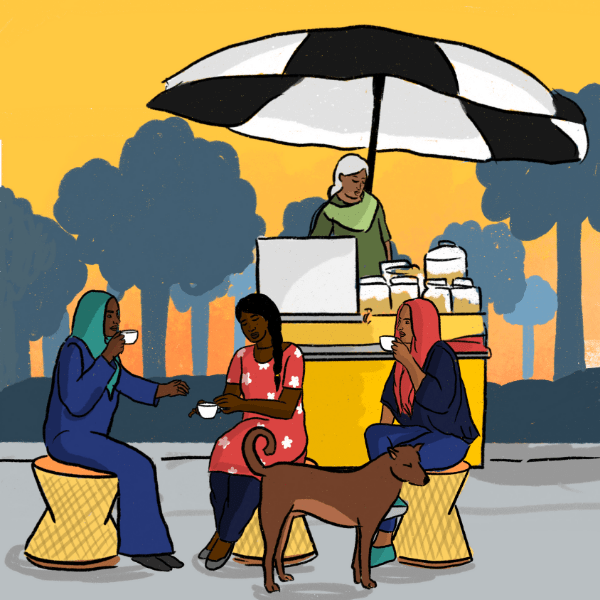Co-authored with Ishani and Manasi Pant
It is no secret that instances of sexual violence and harassment are rampant in India. We hear about such cases every day throughout the country, and what is more worrisome is that these are only the cases that made it to the news or were reported. In our lived realities, we know how we, and many women we know, often don’t report cases of sexual assault, owing to various reasons.
At the top of the list is the anxiety of police apathy. Interactions with judicial systems often feel intimidating, and unfortunately, the onus of actively seeking justice falls on the person who has been at the receiving end of the assault. The journey to justice is thorny with constant instances of re-traumatisation. Systems collectivising to dismiss cases of sexual violence isn’t uncommon either. Often the apathy of police roots in the belief that incidents of sexual violence are frivolous and it’s okay to not engage in such cases as the victims might anyway be unaware of the laws.
The complexity of the language, lack of understanding of the law, and the in-accessibility of information further strengthens structures that are primarily hetero-patriarchal in nature. Hence disseminating those pieces of information among individuals is essential. Information aids decision-making; information has a transforming effect on how we choose to navigate through a situation.
Information doesn’t only help in knowing and acting on reporting cases of sexual assault but also in holding systems accountable that deny justice.
Also read: A New Study Talks About Sexual Harassment Of Women Journalists In West Bengal
In 2018, two students of Symbiosis Law Hyderabad realised that Symbiosis Law School mishandled complaints of sexual harassment when they tried to file a complaint against a professor. They proceeded to write to Maneka Gandhi, the then Minister of Women and Child Development and other organisations including the National Commission for Women (NCW) about this. Following more developments in the case, the Dean then threatened to rusticate the two students and eventually, the college evicted them from their hostels based on a series of vague justifications citing “past misconduct”.
After a year-long intervention by Jhatkaa.org including a petition, repeated phone calls and emails to college authorities, a Twitter storm, and a viral comic illustration on social media, the SLS-H Internal Complaints Committee recommended the dismissal of the professor in question two students were back to the university campus.

Information and access to information help individuals claim justice for themselves and dismantle the larger systemic culture that perpetuates sexual assault. Here is how the personal becomes political and politics becomes revolutionary.
Interesting parts of women & child protection laws
There are parts of the law that don’t often find space in the popular imagination, thanks to the grossly hyper masculine depiction of the police force in movies. It’s good to know the protocol that should be followed while filing a complaint so that we are not taken advantage of and can be empowered citizens demanding a smooth filing process.

Here are some interesting – and very useful – things that we should know about the law:
- Reporting to a woman police constable: If a woman goes to file a complaint at a police station, the person responding to her has to be a woman police constable. Some police stations ensure this proactively, some have to be reminded.
- Registering an F.I.R: Once you have identified and reached the police station, you can file a complaint and register an F.I.R. The F.I.R is generally a description in the nature of a complaint that is reduced into writing to get the police to start an investigation. Once an F.I.R is filed, the officer must give a copy of it to the person filing it.
- What if the police officer refuses to register the F.I.R?: Remember, nobody can stop you from reporting a crime. If the officer in charge of the police station refuses to record the F.I.R, then the affected person may send this information to the Superintendent of Police. Suppose the SP is satisfied that this information discloses the commission of an offence. In that case, they may either investigate the matter themselves or direct another police officer subordinate to them to do the same.
- Seeking help at Legal Aid Clinics: If for some reason, you require any legal aid or advice, you can contact a Legal Aid Clinic near you. Generally, legal aid services constitute services of volunteer attorneys who wish to assist or advise those clients who may not be able to afford a consultation otherwise.
- What acts constitute “outraging the modesty of a woman”?: Usually, when we hear this phrase, it gives the impression that instances of harassment have to be “severe” in order to be considered an offence. However, the courts have held that the essence of a woman’s modesty is her sex, and that mere knowledge that an act will lead to its outrage is enough for the accused to be punished. Even holding the hand of the victim when there is an intention to outrage the modesty of a woman is punishable.
Active Bystander: The real hero
The 1997 Bengali film Dahan, directed by Rituparno Ghosh, and based on Suchitra Bhattacharya’s story of the same name, revolves around the lives of two woman protagonists, one, Romila who was a victim of street sexual harassment, and the other, Jhinuk who actively intervened to save Romila. Jhinuk was immediately hailed a heroine by the press. As she was celebrated for her utter ‘bravery’ by her friends & family, her grandmother was indifferent. While Jhinuk asked her why she was not excited about her granddaughter’s courage, she calmly responded by narrating a story — while she was a new bride, she once forgot her purse in a taxi and that made her very anxious. Thankfully, the taxi driver came back to return the purse. Everybody at home was amused by the honesty of the taxi driver and was quick to celebrate him. Though she was grateful to the taxi driver, she also pondered, isn’t this normal? Aren’t you supposed to give back the valuables to the person to whom it belongs? Then why are we celebrating a person just for staying true to their ethics?
The grandmother connected this incident to her indifference to Jhinuk’s ‘bravery’. In her opinion, what Jhinuk did is something any bystander should do. Why should one be celebrated for doing something that should come to them naturally? The film meaningfully crafts the dichotomy of what is normal and what is normalized.
In many ways, it is normalized to not engage in other people’s problems, even if the violence or harassment of a person is happening openly in broad daylight. Findings through survey that states nearly four out of five women in India have faced public harassment ranging from staring, insults and wolf-whistling to being followed, groped or even raped or news headlines such as ‘Man murders wife as passers-by look on’ aren’t rare or uncommon even when we are stuck in a pandemic. But why wouldn’t the bystanders engage in scenarios where their intervention can lead to often saving lives? According to psychologists, we can blame this on what is known as diffused responsibility, the feeling that someone else will do the job, otherwise known as the bystander effect. A psychology glossary online defines something called ‘Bystander Effect’ as ‘a social phenomenon in which a person (or persons) are less likely to offer help to another person (or persons) when there are more people around who can also provide assistance. […] Thus, when in a group, people are less likely to offer help than when they are alone.’

Although counterintuitive, it is quite common in sexual assault cases.
There can be many reasons why bystanders wouldn’t engage in helping someone, but at times it is also about not knowing how to intervene even if they have the best of intentions. To combat this phenomenon one can either 1) Intervene directly, 2) Take the victim away from the situation, 3) Intervene indirectly, 4) Call for help. While direct intervention seems to be the most common answer, delegating an intervention is also equally effective. One can do that simply by asking directly the victim if they need help or for indirect intervention asking them about time or directions to a place. The bystander can also ask for help from other people. More people looking at the scene of harassment is deterrence in itself.
How to ensure online safety
Offences related to harming another person’s well-being through the internet, or an electronic device, can be registered under the IT Act. These offences include transmission of obscene letters, vulgar emails, publications denigrating the character of a victim, creation of fake profiles, among others. The laws related to cybercrimes under the IT Act include the following:
- Section 66D punishes a person for impersonating another using computer
- Section 72 punishes a person for breaching confidentiality and privacy
- Section 67 punishes a person for publishing or transmitting obscene material in electronic form.
- Section 67A punishes a person for publishing or transmitting material containing sexually explicit acts in an electronic form.
As important as it is to be aware of laws related to online safety, it is also essential that we know how we can report instances where our online security has been compromised. How we can report our concerns are listed below:
- Cyber Cells: Cyber Cells have been established to provide redressal to the victims of cybercrime. If you do not have a cyber cell at your place of residence, then you can file an F.I.R in a local police station. You can also approach the commissioner or the judicial magistrate of your city if you cannot file an F.I.R. Any police station is bound to register an F.I.R., irrespective of its jurisdiction.
- Online Grievance Redressal: Women who do not want to come out in the open can file a complaint against stalking through the Complaints Registration Form on the National Commission for Women website. In serious offences, the commission can set up an inquiry committee to probe into the matter and conduct spot inquiry, collect evidence, examine witnesses, summon accused and police records, etc. to further the investigation.
- Report to the websites: Most social media websites where users make their accounts provide a reporting mechanism. These websites are obliged under the IT (Intermediary Guidelines) Rules, 2011 to act within 36 hours to disable information related to the offending content. The intermediary will have to preserve this information and associated records for at least ninety days for investigation purposes. The affected person can report any offending content hosted, stored, or published on their computer system through writing or a signed email.
- Report to CERT: The Information Technology Amendment Act 2008 has designated the Indian Computer Emergency Response Team (CERT-IN) as the national nodal agency for tackling the issues occurring in tow with computer security threats. They issue guidelines on the procedure, prevention, reporting, and response to cyber incidents, among other functions.
Unfortunately, most of these laws still uphold a binary understanding of gender and fail to protect persons with other marginalised gender identities. It seems to be a long way from now that we can expect both systemic change and a mindset shift in the country when it won’t be such an unsafe space for individuals to navigate. We can gain some control over our safety by recognising the lesser-known facts about the laws, the possible avenues to help someone who is being harassed, and knowing the nuances of online safety in this increasingly virtual world.
Know more here.
Ishani is the Campaigns Manager for the Gender & Sexuality team at Jhatkaa.org. Follow them on Instagram.
Manasi Pant is a Gender & Sexuality campaigner at Jhatkaa.org. Follow her on Instagram.
All images courtesy Jhatkaa.org
About the author(s)
Sudipta Das(He/They) is a communications professional having experience of working on issues around gender-based violence, child rights, queer rights and sexuality. They have been an India Fellow'17 and a Likho Citizen Journalism Fellow'19. They believe in intersectional feminism and wish to write elaborately on the subjects of media, caste, sexuality and mental health.



